![]()
The Words of the Kirkbride Family
|
|
The Words of the Kirkbride Family |
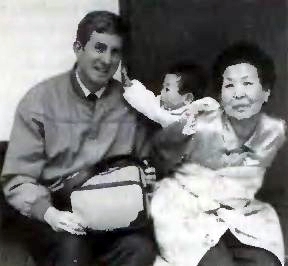
Patrick
and church halmoni.
Patrick Kirkbride is one of the two IW's for the Western members in Korea. The other is Nate Windman. This is a testimony by Patrick at the completion of the first three months of mobilization.
For brothers and sisters from the 1275 Blessing who could not participate in the mobilization for various reasons, please know that we in Korea are representing you. At present there are approximately 300 Western members in Korea involved with different projects, from helping deliver the Segye Ilbo to teaching at our Seonghwa Seminary, that many of the older blessed children attend.
Besides members from the 1275 Blessing, there are approximately 3700 Japanese members from the 6500 Blessing, many of whom are going to school in Seoul to study Korean. In most church centers, there is a combination of Japanese and Western members, and the Korean pastor's family. Living space is a rare and luxurious commodity. In most cases the church pastor and his family have sacrificed most of their living quarters. I've been shocked more than once to see a family of four living in one room, in which the bedroom turns into the dining room and then the family room, because they give our brothers and sisters the other rooms. Some church centers have built extensions onto the living quarters to accommodate us. In some centers, brothers or sisters sleep in the church sanctuary.
Father is involved in many, many projects. Many of the small villages have simple and beautiful A-Frame churches, designed by an architect who originally met Father when he was studying in Japan.
Most places were not equipped with hot water, so most Korean families use public baths, which are an integral part of Korean life.
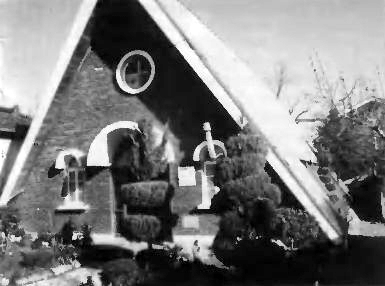
Beautiful
A-Frame churches have been constructed around the country.
Up to now, I've spent over three months in the Fatherland. The challenges I have faced were many. An obvious one was the language barrier. Not only does one realize the necessity of learning Korean, but also of inheriting the culture and tradition of Korea's 4,000 year history. Only then can we begin to understand the Korean character. One major problem as Westerners is that we look at everything from our own point of view and usually it is not the same as the Korean perspective. We were given advice from elder Western brothers and sisters who have been living in Korea for many years. Their advice was "make observations, not judgments," "take initiative; don't wait to be told everything to do," and "learning Korean takes time; don't be impatient." These insights came like water to thirsty people.
A very good book about Korean culture is called Korean Patterns. Initially, many of us think that Korean culture and heavenly culture are almost the same. In some ways they are, but in other ways they are not.
There is something very special about the Korean people. From the Principle we know the historical significance of this tiny mountainous peninsula. From that perspective we can appreciate what these people have been through. As a result of the Korean peoples' long suffering and perseverance, they are emerging like diamonds popping out of the earth. They have a providential blessing. As I traveled around the country, I could sense that this country is quickly progressing. Besides that, everywhere you look you see children tied on the backs of their mothers by a blanket. Half of the population is under 20 years of age.
When the mobilization staff went to a concert in Seoul, we noticed that most of the crowd were teenagers. They were so involved in and enthusiastic about the performance. Also, young and old alike love yute. They play on the sidewalks, throwing the sticks with great vigor. We could sense a really passionate side to the Korean people.
People work from early to late, seven days a week. When I would go back to our church around 11:00 p.m., I would see many people, young and old, still working. The shops are usually open till ten or eleven, and street vendors stay out equally late. They are strong people; 50 or 60 year old people work in the fields all day long. It's inspiring how diligent they are, but I also feel that people that age shouldn't have to work so hard; you can see in their faces that it takes its toll.
One of the most precious opportunities we have in Korea is to live with elder blessed couples. That means eating, praying, working, and sometimes sleeping with them. Also, to see the relationship between the parents and children gave me much hope for the future of the world. Our True Parents' love and tradition can be experienced in many church centers through the church leader and his family. One major point we noticed is that we took our baggage of fallen nature with us to Korea, where it was magnified and exposed, especially to ourselves. Yet I could watch the church leaders digesting all kinds of different situations with the heart of our True Parents. Sometimes they would scold us and sometimes be patient, depending on what was needed.
Last year Father initiated the providence of the blessed wives going to their hometown for three years. So at a number of centers I went to, the one who was cooking meals for everyone was a 777 Couple wife. It was amazing to see our elder sisters serving and cooking for the members. This is their second year of separation from their family; some of the younger children are with them but the older children who attend school stayed with the father. It is the providence of tribal messiahship. The few times that I saw Father, that was his topic. The direction is to witness, which seems to be the same in America, too.
I would like to share some of the testimonies I heard while I was there. First is the story of a Japanese sister who was blessed to a Korean brother from the 124 Couples Blessing. Father prayed at the blessing time in 1982 to protect her because he knew that to fulfill this position would be almost impossible. She then moved with her husband to Korea.
For six years she felt completely ignored by the pastor and during that time she felt the only communication from church elders was when she did something wrong -- then they would scold her. In her dreams Korean soldiers would attack her with knives and try to kill her. But she would say, "Don't kill me; I have to pay this indemnity." She prayed for the liberation of those who were resentful to her and to Japan. After six years she was victorious. Now she helps others in similar situations. She feels responsible to help them overcome their pain and suffering by understanding the historical significance of their course.
One older sister had joined the church in 1958 and remembers when Father first said that Westerners would come to Korea. I was the first Western brother that she had ever seen, and she started crying because Father's words were finally manifested.
The wife of the pastor in a town near Taegu shared with us about the responsibility of blessed couples. The biggest responsibility is to follow Father's direction. That's all. Just follow what Father wants. She gave an example of one couple. Years ago Father could see everyone was getting too comfortable with their missions and decided to have a lottery so that the church leaders could pick new missions. One church pastor had picked to become a printer. But he didn't want to be a printer. So he convinced the printer to stay a printer, and he stayed as the pastor. A little while later there were many serious misfortunes among his church congregation, and he realized he had to repent because he had not followed Father's directions. She said it so simply: just follow Father's directions.
In the town of Kumi, I met another of our elder sisters. She has been a member since the late 1950's. She is slightly bent over but every day she passes out the Segye Ilbo with great enthusiasm. She is a source of inspiration for everyone. She feels so indebted that she can't do enough. As she shared her testimony with us, tears came to her eyes because of the days when it was so much more difficult than it is now.
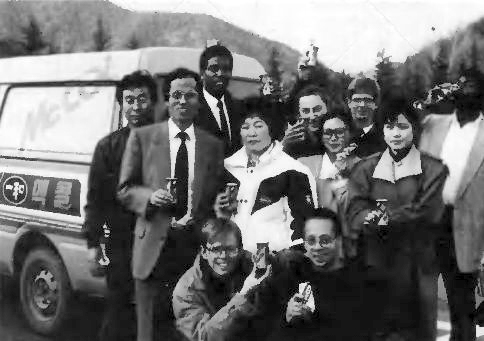
Enjoying
McCol after a mountain walk.
The Koreans have had their country invaded so many times that they sometimes don't want foreigners. The persecution is not so clear to us sometimes because of the language barrier. I think that the Japanese have much more obvious persecution than we do. Father told the Japanese members blessed to Korean spouses that they were there to heal the hatred the Koreans have for the Japanese. Through their true love the Koreans will repent for their hatred.
As soon as you mention Unification Church, people might be very quick to say "I don't like your church" but they are friendly about how they do it. It seems similar to the persecution here; no one has really checked it out for themselves. Persecution has been so strong in the past, but now many of our Western members are bringing high level people, like doctors and principals, to Sunday Service. There have been a number of testimonies about how vigorously the Western members witness. So a lot of people are coming; some are signing membership already and going to 7-day and 21-day workshop. There are a number of spiritual children.
The Koreans haven't had so much intercultural experience; they need to become more worldwide people, too. My realization is that we are like the forerunners of the International Highway, which will provide a way for all people to come to Korea in the future. When we get out into these small cities, they have never seen foreigners.
Many of our brothers and sisters have a hard time feeling their value because their result is often more internal than external. One elder said distributing the papers is like distributing Holy Salt all over the nation, every day to every house, and that our result is more internal. This reassured us. After breakfast, we have Korean self-study, and then witnessing and home church a bit in the afternoon. Video centers are opening up around the country and many guests are coming.
The first three months definitely seemed like the foundation stage, so the next three months will be the growth stage in which we expect even more challenges. The Western members will have to take more responsibility after our initial adjustment stage. It is time to be more serious and to invest more in learning Korean and understanding in our hearts why our True Parents brought us to Korea.
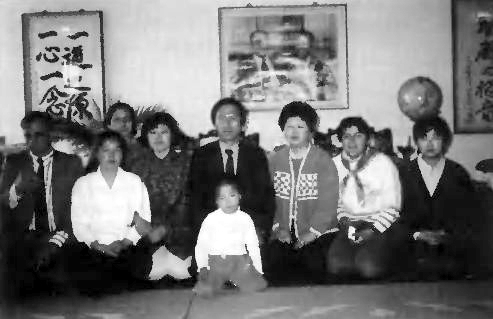
Brigitte
(third from the left) with the church leader's family and several
mobilized members.
After participating in the Blessing I was mobilized to Taegu City in the Kyung Sang Buk Do Region. I would really like to give tribute to the regional leader, a 777 Blessed Couple who has an incredibly clear mind and always seemed to do the right thing or approach the right person at the right time. His name is Rev. Lee Dong Han, but he was addressed as Kyoguchong-nim, which means "first leader." (The next person in the hierarchy is called Bukyohaechong-nim, which means "second leader.") When we first saw him, he looked quite serious, but the very first week we experienced how much he was personally involved with us. He was always teaching IFVOC or Divine Principle, or giving clear guidance and love to members and being out there with us. He was consistently a part of everybody's life. He was never just in his own little private area -- his own family hardly ever saw him, but he would never turn us down if we came to talk to him. We felt God working through him and everything he did so that things always fell into place. It was very wonderful.
As the leader of the whole Kyung Sang Buk Do Region, he was teaching IFVOC to people for the unification of North and South Korea. People were fascinated when he spoke because he was living it. It's somehow a different vibration; everybody wanted to be just like him. He understood Principle so well that, like Father, he didn't have to prepare to speak. People really treated him like Father, too. When he left the center, everybody came out to say good-by. When he it as with Father and couldn't be there, something was really missing, and when he came home, someone called ahead so that everybody would be expecting him. First he would sit down with us and always bring some gifts. His children would jump up and say hi to him, but he would just be with us first.
On Friday evenings he would always visit different home church families. He would give a little sermon there; everybody wanted him to visit.
In present day Korea, everybody lives practically on top of each other. When we would go to other families, they would invite so many people, but there wasn't any space. People would continuously come, even sitting out way into the hallway areas, just to pray together. Nobody calculates if there will be enough space: whoever comes, we will make space somehow.
Every Monday morning when we didn't have the newspaper to deliver, Rev. Lee would teach us Westerners something about the meaning of the Blessing, the meaning of witnessing, what it means to have faith, and so on. It took him a half an hour to say, with his dictionary, something that you can say in five minutes, but every sentence for me was like hearing God speak. He was such a channel of God, I felt almost like an empty cup experiencing an overflowing cup. One time was when he spoke about Jesus' words, "If you love me, feed my sheep." It just struck me how much maturity it takes to love. If you love your leader, you should take care of everybody else and give him the love in that way. Another time we had a meeting because according our schedule we were supposed to study at 9 a.m. and then have 10 o'clock prayer, but almost nobody was doing that. Some were sleeping, others were doing different things. So he gathered us all and said, "Now, what have you been doing?" Everyone had to state what they had been doing. He wasn't making us feel bad; he just wanted to remind us once again that we had a schedule. He would always make us stay centered, then the next moment he would embrace us. He would say in English that we should always tell ourselves "God speaks today. What am I doing now?" I started crying because I really felt this was true. It's now that matters -- not the past or the future.
I could sense how distant I still was from God from experiencing someone who is already close to Him. I really felt I was in the presence of a saint. He was loved and respected by everybody, and was always there when something was needed. I felt like a child who was with a protective and embracing parent, so leaving him to come back to America where I felt more on my own was quite painful. I even wrote Father to let him know that someone is doing such a good job of helping and loving brothers and sisters. I think we should give tribute to those who have that kind of heart.
The external circumstances were quite amazing. We had rice three times a day with kimchee, or some other dishes, in a bowl that we would share. Many times the food was very unusual. But even though in Korea they don't have much money, they always tried to give us extra and special things. Sometimes they gave us what they called bread, but really it was like cake, or they would get eggs for us or something else that felt like home a little.
In most places there is only cold water. You go to public bath houses to bathe. In our center we did have warm water, but in the morning someone was always out there shouting "Bali, bali" meaning "quickly, quickly" when you were taking a shower.
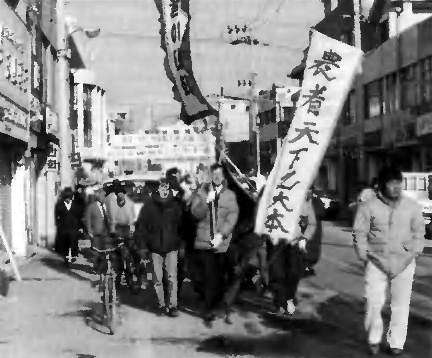
Several
members participate in a city parade.
In our schedule, wake up time was 4:00 a.m.; 4:30 we prepared the Segye Ilbo papers; 5:00 was prayer time. We also had a slogan every morning that was said in Korean, English, and Japanese. After the 5:00 prayer and slogan, we would go out with the papers and do our route, which was anything within walking distance, sometimes even 45 minutes away. Almost no one has a personal car in the church in Korea; there are only vans. And most people cannot drive; not even our church leader could drive. A couple of brothers did all the driving and if they were not around, you just walked everywhere.
Every day we would do a different area, so different people could see the Segye Ilbo. The Korean brothers had a certain route for subscribers and dropped the papers off for them every day.
From 9 to 10 a.m. was Divine Principle study. The Western members would sit down together, read a page and then discuss it. Then the Koreans would study on their own; they would just write Divine Principle. From 10 to 12 noon we would study Korean on our own.
Noon was lunch time, and in the afternoon we went out getting subscriptions for Segye Ilbo and witnessing. It seems that the people on higher levels are more respectful of us than the poor people of Korea, perhaps because they know that Father is helping Korea's development. It was mostly established Christians and communists who didn't seem to like our church.
Evening time was either study or visiting home church families; the whole church center (about 20 people) as a group would visit them. People from nearby home churches would also meet together every Friday.
On Wednesday evenings there was a prayer and Divine Principle study meeting. On both Sun day mornings and Sunday evenings there were services, all in Korean. Everybody would come to those. Afterwards they would ask us to sing a song from our countries. They also wanted us to try to sing Korean songs to help us learn the language. We were even asked to sing on the radio -- one Portuguese sister, myself and three Japanese sisters together.
The slogan that Kyoguchong-nim gave us to say every morning after prayer was "Let's dominate ourselves, love Cain, and develop the heart to restore all things." Actually, one day I really didn't want to say it, but I wanted to understand why our leader desired that we say it. I wanted to not just say this slogan, but to truly overcome myself, sincerely love Cain, and restore everything. Then a Korean brother and I went witnessing and trying to get subscriptions for Segye Times. At one point, he asked me if I could write down the slogan for him in English so he could learn more English. I asked him to write it down in Korean for me. Just as I was writing "Let's love Cain", a girl came up trying to see what we were doing. She was about 27 years old and spoke good English. In this way, without any coaxing, she came to a couple of lectures on the Divine Principle and was very moved by our leader, who promised he would teach her about God, since she was a Buddhist and did not believe in a personal God.
One time a very outspoken Japanese sister asked why we shouldn't sit on the four chairs reserved for leaders in our meeting room. Of course the reason was to show respect, but the answer they gave in English was, "It's an order system you should follow." She said, "What about love system?" And Kyoguchong-nim said, "Love system is in your room." I really noticed that's how it is in Korea. "Love system is in your room, in your private time." When you are doing your public mission, hard work is number one. You're not just being sweet to each other, you really concentrate on what you have to do. In a private moment you might have a close personal conversation; but in the actual mission there would again be that respect and a certain distance.
I want to mention that the kitchen sisters were absolutely beautiful people -- so serving all day long. One sister had been doing it for eight years, ever since she had come to the church. And there it's a very respected job.
I was deeply moved also by an 1800 Couple wife. Her three daughters were in Pusan with her husband, a professor, and she was with her little son witnessing in her hometown. She was the most sacrificial person, always caring for everybody else, even though I'm sure she had a lot of pain being away from her family. I never saw any down periods. She said she would always work it out between herself and God, or with her husband where they talked. The Koreans seem to be able to hide their difficult times and forget themselves, whereas everyone knows when a Western member is struggling. Even when we left, they tried to smile at us though I knew they felt just like us who were crying.
I never cried because of external difficulties -- the cold or lack of sleeping space or food -- none of that really mattered. The times we actually cried tears were when we experienced God through a person, or when we were confronted with our own limitations. Such experiences of God were the most precious memories of my time in the Fatherland.
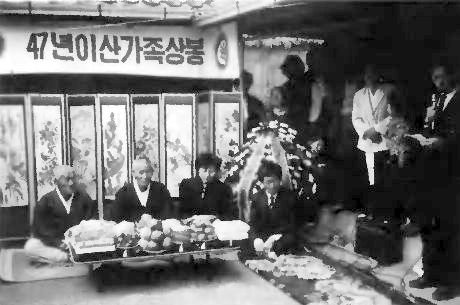
Commemoration
ceremony for 47 years separation of North and South Korea.
The following is a letter to his Japanese wife written in March 1989 by a 1275 Couple American brother mobilized is Korea. The sister who translated his letter into Japanese suggested he send it to Today's World, which he did, requesting that it be printed anonymously. We offer it as a testimony to the mobilization experience in Korea and as an expression of the kind of heart toward the Blessing that heaven must rejoice in.
Peace and love to you, my dear wife, in the Name and heart of our most beloved and precious True Parents.
Our day starts at 5:00 a.m. We put together newspaper packages for our Korean newspaper Segye Ilbo. Then breakfast at 8:00 a.m. The Korean food is a different experience for me, although I'm not severely challenged by it. It is very healthy and for the most part is made to taste very good. Much of God's love goes into the cooking.
Each day of our life here is quite the same in regards to our activities. A lot of time is spent studying Korean. Traveling to the villages provides us the opportunity to see the countryside, and we have done some sightseeing. The South Korean peninsula is full of small mountains. The sight of many mountain ridges stretched out across the land is incredibly beautiful. To look upon such masculine beauty and consider God's heart and love brings tears to my eyes.
Today was a very joyful day. After breakfast we journeyed to a village where we have a nice, clean little church. It is made of a rich reddish-brown colored brick and is quite new-looking amidst all the shacks of the village. From a distance it's great to see a big Unification symbol atop the building.
There are several villages surrounding the church. We split up into teams of three and visited all the villages and homes inviting everyone to come hear a lecture on VOC. Around 150 people came, including the president of the township and other leaders. The spiritual environment was so high. Everyone sat on the floor except the elders, leaders, and us, the foreign members. One man, from the 430 Couple Blessing, gave the first lecture. He spoke softly compared to most Koreans, but had the audience laughing most of the time. The second speaker was from the 1800 Couple Blessing. He spoke very strongly, even shouting for almost one hour, so passionate was his effort. Then we foreign members introduced ourselves and sang five Korean songs, finishing with a cheer also in Korean. The cheer in English is: "We came to Korea for the liberation of North Korea and the unity of North and South." In the lectures the people were very happy to hear that many Japanese and American people have come to True Parents. I believe our very presence here has a profound and deep effect. We are treated so well by all the Korean people. With many smiles and greetings they seem genuinely inspired to see us.
On the drive back home I experienced God's heart deeply. I had to repent forever abandoning Him and forever acting and speaking without being sensitive to His heart. I deeply felt His love and when you feel God's love, you must also feel His pain, His tears, and His longing to bring all His children home.
In our lives there is much we may do to take responsibility. A great responsibility we may fulfill in our physical lifetime is to bring joy to God through our Blessing and to offer Him children without sin. The heartistic is the priority -- then the external details fall into place. As we grow to be absolute in our love of God and True Parents, we can offer God joy by truly loving each other. It pains my heart to see someone using their resentment to cause pain and difficulty for the spouse True Parents gave them. And it usually is over small external things -- like thinking with a small mind.
Perhaps my words are a bit premature, but I am seriously dedicated to love you with God's true love. First because we absolutely must not be a source of pain and sorrow to God when He looks upon us. We must live to inspire True Parents, and all our brothers and sisters, by an example of deeply loving each other centering on God, and embracing others with this love. Second, I am dedicated to you because you are God's daughter. I know the future is not all joy and gladness, and restoration must take its course. Our ancestors may still be enemies. However my determination is to never take you for granted and always remind myself you are first a daughter of God.
We are now on the path to oneness. It need not be long though many are making it very long. If nothing else we must totally erase our own concept about each other. We must have no expectations and receive each other based on the fact that we love God and True Parents, and do our best to fulfill our responsibility.
I feel God's love for you and think of you very often. When I touch or look at my ring I try to reach out in oneness with you. Please know that I have longings and desires that are natural and real and growing to purity. But I consider these desires for love to be secondary to our responsibility to bring joy to God. Everything must be for God. I believe very much that you and I will accomplish this goal. I feel deep gratitude to God and True Parents for helping me become who I am and for blessing me with you. I pray for your family.
May God bless you and embrace you in His great love at this time.
In Their Names, Eternally -- your husband
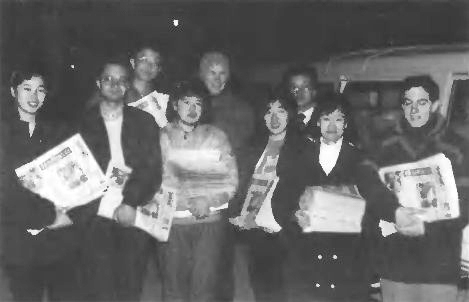
A
Segye Ilbo 3 a.m. delivery team.
Now the weather is very warm, but in February the ground was rock hard and snow was in the air! On February 1 we offered a deep prayer and then gingerly went out -- anywhere. My feeling was just to give the paper to everybody. I approached two young high school students waiting at the bus stop. They took a paper -- God's Providence had begun! I met one kind halmoni cleaning her kitchen and she took a paper. Another man said (in Korean) that he couldn't buy it, but I replied saying there was no charge. He smiled and took a paper. These are such precious memories from my first day delivering the Segye Ilbo. Five shiny blue bicycles appeared in our office soon after our arrival in our chosen province. These were followed by jackets, carry bags, and wet weather gear. We have truly been given so much external and internal love and care by the Korean family and non- family members alike. The mayor of Taechon City, the largest city in this province, gave presents of long underwear to all the brothers and sisters working in this province.
Doing a newspaper route in the early morning one can hear many dogs, cats, and roosters. Even at such an early hour -- before sunrise -- the rubbish collectors are out, sometimes singing happy songs; street cleaners are sweeping up the remaining debris, and by 6:30 a.m. the day has begun for most shopkeepers.
There is so much tradition here in Korea, both in a formal and informal sense. There is a genuine feeling of trust and friendship. If you really need to go somewhere in a hurry, you can hail an occupied taxi and see if he is going in the same direction! On the buses the fare is paid into a plastic box, without the scrutinizing eye of a bus driver. Children are given priority for seats in certain situations. Large carry bags can be handed to anyone who is sitting down by those who have to stand. When a new shop opens up, all the close friends and associates are invited. They attend, bringing gifts of decorated shrubs and plants. Brightly-colored ribbons, with words of good fortune, and circular flower banners decorate the sidewalk.
The tradition of spring is beautiful to behold! At a nearby major intersection there was a vacant corner that I used as a shortcut. But now it has been transformed into a pretty pansy bed of white, yellow and purple flowers. Soft green grass is growing along the riverside; magnolia trees have magnificently announced the arrival of spring.
The first three months have indeed been so special despite the obvious difficulties in adapting to life in a different country. May the following three see a greater accomplishment that can be offered to our True Parents, from all the brothers and sisters called, chosen and sealed for this historic mobilization.